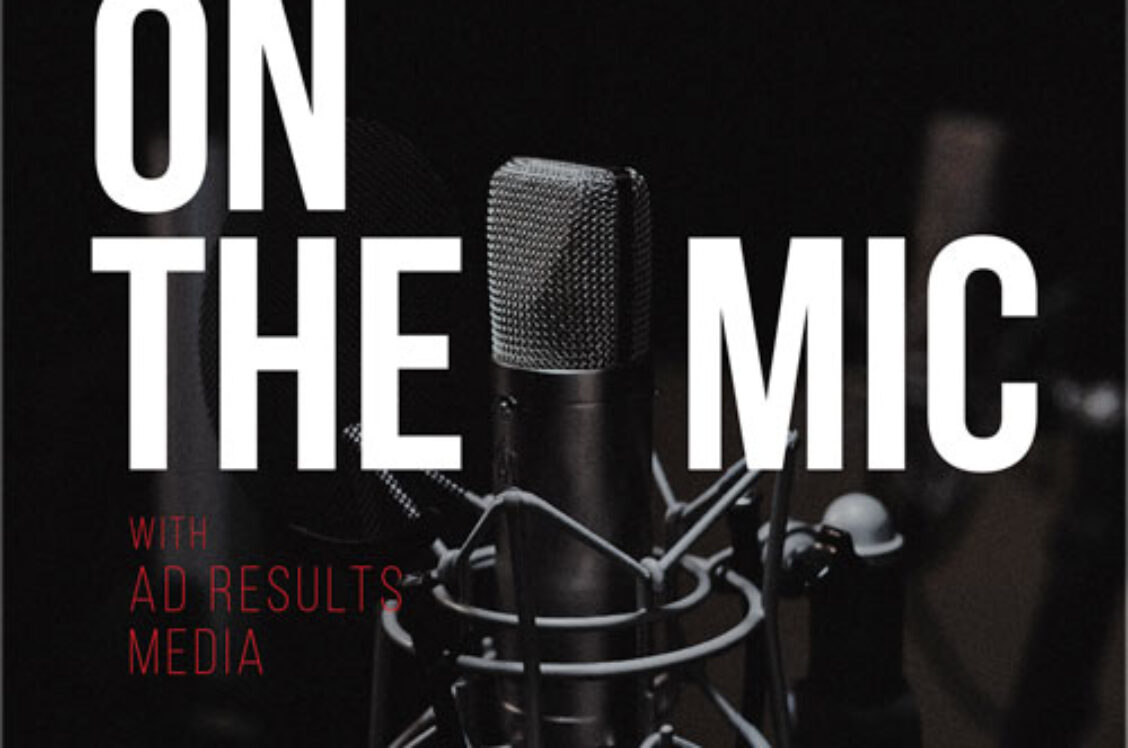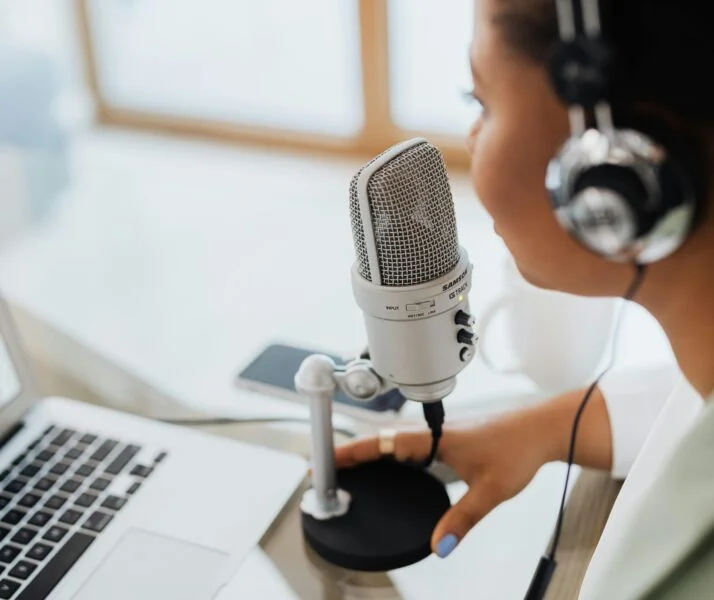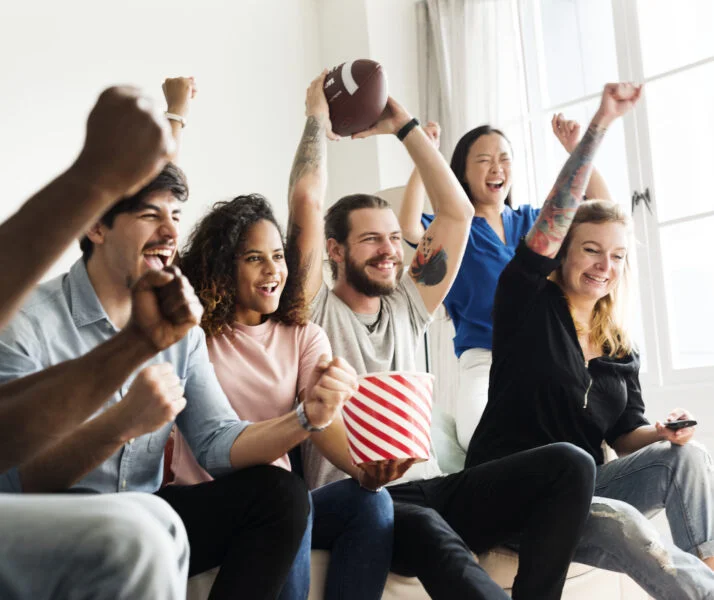
From shorts featured on ESPN to documentaries on HBO, Andrew Jenks is no stranger to storytelling. In Episode 5 of On the Mic, Nathan Spell and Lindsay Boyd speak with Andrew about the differences between podcasting and film making as storytelling mediums and what inspired him to make the leap into the audio world, as well as his advice to creatives on how to monetize your podcast and inject your own brand of creativity into your ad reads.
Podcast Transcript
(0s):
From shorts featured on ESPN to documentaries on HBO. Andrew Jenks is no stranger to storytelling. In today’s episode, Andrew joins Nathan Spell and myself to discuss his move into Podcasting, the obstacles he encountered and his advice to storytellers everywhere. So let’s get started. That’s the great thing about stamps.com. They grow with you As much fun as I had. I couldn’t wait to get back to my sleep number bed. I love my third love bras. They’re hands down the most comfortable bras I’ve ever owned. I love making blue apron and I love it. It’s my me time, Andrew, thank you so much for joining us today.
From Filmmaking to Podcasting: Andrew Jenks’ Evolution as a Storyteller
(47s):
Many of our listeners will already be familiar with you and your work, but can you tell us a bit about your background? Yeah, of course. Thanks for having me. I have done documentaries and TV shows in the past. I made a movie about what it’s like living in a nursing home for HBO. I’ve made a couple of sports movies for ESPN 30 for 30. I have a movie that’s on Netflix right now called dream killer. And so that is kind of my, my background. So filmmaking in Podcasting are both storytelling, but I’m sure some pretty big differences. I’m I’m curious. How did you come to make that move into the podcast space?
(1m 27s):
It happened almost by accident in a great accident. It was, I was actually pitching a documentary about this time in 19, 1981. I believe where there was this guy on, I think the seventh floor of an office building in Los Angeles and his name is Joseph and Joseph is threatening to jump off the seventh floor and commit suicide. He’s apparently a Vietnam vet and cops go and try and talk him down. A psychologist, I think goes up 200 or so people are down on the ground floor yelling and it’s this huge commotion. And as it turns out, Muhammad Ali’s best friend is in the crowd calls Muhammad Ali and Muhammad Ali shows up only a few minutes later, goes up the seven floors and talks the guy out of committing suicide.
(2m 15s):
And there were a lot of reasons that I was after hearing about this story on some sort of Twitter handle. I was very speculative. I didn’t, I didn’t really believe it. There were a lot of reasons that it just didn’t make sense. And I was curious what really happened. And I pitched this to the Rock’s production company, Dwayne Johnson’s production company. And in a meeting, someone in the meeting said, I feel like I’m listening to a podcast. And this was about three years ago. And I said, what I think I know, but what’s the Podcast. And they told me, you know, a little bit more and we brainstorm some more. And the thinking was that could be the first episode of a series where I look into what really happened with different news events or public figures and certain parts of their that maybe there was some sort of mystery surrounding them or a particular event.
(3m 3s):
And that’s actually how it all began. This the sort of film to Podcast transition. How many podcast episodes would you say you’ve recorded now Redo our main episodes and then redo our reaction episodes, which include listener feedback and, and interviews that I do with other people that may be somewhat related to the stories we’ve done. So for what really happened, we’ve done about 50 episodes over the course of three seasons. And then I have another podcast called gangster capitalism in that podcast is season one was about the college admission scandal. So going back to the difference between filmmaking and Podcasting, I’m curious, like what are the maybe sort of unique obstacles to Podcasting that are different from film?
(3m 50s):
There’s one big difference that I noticed between film and TV and Podcasting. And that is particularly with a movie and, and, and more or less with TV, you expect that the audience is solely watching your movie. They aren’t doing anything else. Likely. Even with TV, I had to show on a couple of shows and MTV, we would expect there may be on their phone or on online in some capacity, but their primary focus is, is watching whatever you put together with Podcasting. It’s almost the opposite. The primary thing that you’re doing is likely driving commuting to work, cleaning up your, you know, your house or, or your apartment doing some sort of errands.
(4m 34s):
And so in a way, some people may disagree with us, which is fine in a way you have to be, you just have to be much more aware of that. And you have to be in a way, a little bit less precious with the storytelling. And so if I’m 45 minutes into an Episode and I’m referencing someone From the first 10 minutes of the episode, I’m going to need to remind you a little bit who that person is. And there are creative ways to do that. And there are other ways that aren’t as creative, but that’s one thing. And the other thing too, which I’ve learned from other shows like this American life does a great job of it. Inevitably, even if it’s an incredible story, there are certain points in a story when someone is going to start to, to get distracted and think about something else.
(5m 15s):
It’s very similar to when you’re telling a story at the dinner table with friends and you kind of notice people were into the story, but you’re starting to lose them a little bit. So you need to say something or say in a certain way or say a word, and we all do this. Subconsciously we may just not know it. That will kind of snap and, and get everyone’s attention again. And so that’s another thing that you need to do, I think, in Podcasting and it needs to be done deliberately that you don’t really have to do in a, in a movie or two. Yeah. That’s a really interesting difference. I’ve definitely noticed myself cause I listened to a lot of Audio. I’ve noticed times when my attention has kind of drifted and I’m like I had to rewind. So I think that’s a really interesting point to think about from the creative side, how has your developing your taking maybe the distracted nature of the listening environment and to account that’s really, really cool.
(6m 4s):
It is a really interesting story, but you gotta, you gotta let the audience know about five, you know, three minutes worth of facts. So it’s going to be for lack of a better word of boring three minutes, but the necessary three minutes, a good podcast, or we’ll do something in there to make sure you’re still awake without you even knowing it. What would you say is maybe the most surprising thing that you’ve learned as a, as a podcaster in the last three years? I come from PR especially more recently, I come from TV and so I had a TV show that was on the more serious side. It was more of a more dramatic. And we would go From right before commercial break, I would say something or someone on the show would say something and it’d be really serious.
(6m 50s):
You know, it’d be sometimes life and death stakes, and then that would end and then boom, cut to a commercial about cereal or about laundry detergent or something. And no matter how great the edit was and the scene was, once you cut to that commercial, it really kind of killed this thing that you had worked on so hard. It’s just the tone of everything. It just kind of collapses. And so I actually would never, this sounds very like a little artsy, but I would never watch the show on TV. It would be a little bit of a bummer. What I love about podcasts. And I say this all the time to people is how you can take ownership of the ads. And I host the show. I write the show of my co-write, the gangster capitalism Podcast.
(7m 33s):
First off you get to pick where the ads are. That’s like, that’s kind of unbelievable. And then you can more or less, there’s some exceptions, but with most of the ads, they encourage you to tailor, make them if you will. So if I’m coming off of a really serious point in, In, and my energy is at a certain place all, then begin the ad with something that’s similar in tone. If it’s something really funny, then I’ll kind of continue along with something that is more on the lighthearted track. There’s another part of Podcasting that also surprised me, which is you get to spend much more time on telling your story as efficiently as possible. By that, I mean, I was in Missouri shooting this movie, that’s currently on Netflix and we needed to get a shot of the outside of the prison that we were filming at.
(8m 18s):
We wanted it to be the sun, sun rising. So we wake up at 5:00 AM, bringing on a tripod at six 30, am we get the shot? It’s going to be like a two-second establishing shot just to let the audience know where we are in the scene, what’s going on. And that’s like three, four hours for this one shot. That’s two seconds in a Podcast in the script. I can just say so now we’re outside of a jail in Missouri. It’s the early morning boom done. And I can spend the rest of my day, are those like what equivalent of two hours would be into really telling the story of the best, most efficient way and entertaining way possible. So it’s interesting to me, it might come across as like, Oh, what are you lazy to go get a shot? But it’s actually that you can spend that time really honing in on story.
(9m 2s):
And that’s something that is what people like me wake up and get excited to do that took a while to get out. But I got it out. No, it, it makes sense. I do some short film making on this side as well as some Podcasting and voiceover work. So I, I really relate to what you’re saying, Hours on end for one shot. And then you get to the edit and you’re like, no, I’m not even gonna use that. And you’re like, damn it. And that, that kind of loss time doesn’t exist as much as much with Podcasting Participate every year in the 48 hour film project where we have 48 hours to write film and edit a seven minute long film and we could spend 15 hours and get five minutes of something usable, but I can go into the studio for two hours and, you know, create a whole, a whole storytelling Podcast.
Navigating Podcast Production: Engagement Strategies and Creative Advertising
(9m 52s):
So to piggyback off something that you said earlier about kind of having more control over your Advertising, we focus primarily on creating effective ad campaigns for our clients. How do you inject your own brand of creativity into your ad reads? I, a lot of times we’ll try and make sure that there is a connective tissue between the ads themselves and the podcast that I’m doing to be clear that doesn’t always happen. But an example would be in season two of what really happened. We did an episode that was focused on the former Russian president, Boris Yeltsin. And so this episode is going into who he is and what he’s like, and then Rehad and Ad for Quip.
(10m 34s):
And so rather than just reading, you know, I got my Quip toothbrush in the mail, it, it vibrates and it does all these things and it’s really cool, which is all true. I instead spent some time and as I recall, it wasn’t that much time I Googled Boris Yeltsin teeth. And, and as I recall on the first page, I think was a wall street journal article. Maybe it was an article about how Boris Yeltsin apparently had terrible teeth. So I started the ad and a lot of people didn’t realize it was an ad, but I started it with this may seem like a side note, but as it turns out, Boris Yeltsin had terrible teeth. And then I say, if only Boris Yeltsin had Quip, Quip is dah dah, dah, dah.
(11m 17s):
And I think that way, rather than just like selling it blatantly on the lease, going to give you some, an interesting piece of information while I’m selling it. And I’m also doing it a little bit tongue in cheek, like we’re going to have some fun with this. And I think that’s an important part of the ads too, is to like lean into who your personality or lean into the topic that you’re already talking about. And that way it almost becomes something that people are looking forward to as opposed to something that they want to skip over. It connects the, the show, but it’s also entertaining. It’s entertaining in and of itself. I love that. Yeah. Great. Another example is a sleep number. I remember when I first saw the sleep number and the one part that was I had to read was what my sleep number setting was and what my girlfriend’s sleep number setting was.
(12m 2s):
Well, I don’t have a girlfriend. I wish I did that. So I just leaned into that and rather than kind of responding or saying, like, I can’t read, I can’t read this part that I have to read. I was like, well, let’s have some fun with this. So now everyone who listens to my show knows that I am the single guy who doesn’t know the sleep number, setting to my girlfriend because I don’t have one. And I it’s become kind of like a running joke amongst me and the audience. And that’s the other thing about Podcasting too, is it’s pretty personal. Like people either have, you know, they are listening to you in there, literally in their ears. They have headphones and their listening to you in a very sort of personal way or maybe there in the car, but its pretty personal and that’s what also is unique.
(12m 44s):
And so you just got to find ways to make it work even better.
Andrew Jenks’ Blueprint for Aspiring Podcast Creators and Storytellers
So what would be some advice you might offer for, for any storytellers who are wanting to break into the Podcast space? The way you did just a few years ago, Two things come to mind. You have to, I think really be obsessed may be too strong of a word, but just in trance, in love with what you’re talking about, regardless of whether you are a Democrat or Republican, if you listen to pod, save America, you definitely get the sense that those guys are talking politics. When they’re not on the show, that is their life, they are consumed by it. They would be having those conversations. They are having those conversations, regardless of there being a Mic in front of them.
(13m 25s):
When I am not recording or researching, I’m still talking to friends or producers about the stories I’m working on in some capacity, I’m like totally obsessed with them. And I’m really curious. And until they air, there’s always a part of me that that’s thinking about them. It needs to be something that you really do love. And then I think the other thing to consider that oftentimes is overlooked is who is your host and why are they your host? Like I was talking to a high school kid the other day and he lives in Utah and he said, well, what kind of story could I tell? And I said, well, you know, knowing that you’re in high school, so you’re stuck in the town you’re in, I bet you there’s some mystery in your town, in the history of your town. There’s, there’s probably even like a missing person or murder mystery, at least in like within a 20 mile radius in the history of your, Every small town has one.
(14m 11s):
There You go. So go look into that. Someone out of a co out of New York or LA or some city, they don’t have access to your town. They’re not, they can’t afford to send someone likely out there and just investigate the history of the town. So go do that. And then it makes perfect sense for you to be telling this story. You have access to information, to people, to everything, and all of a sudden you own that slice of that potential story. So stories are everywhere if you kind of just keep your eye out and don’t make it too. Okay. Is it also kind of to those new creators out there, or maybe even folks who have been in involved with Podcast for awhile, but maybe haven’t gotten into Advertising yet.
(14m 53s):
What advice would you offer to them as far as like monetizing their Podcast? If you’re a creator out there looking to monetize your podcast, I had the fortunate experience of coming from documentaries and having done them for about 10 years or so before I got into Podcasting. So I was able to show that as, as sort of work that I’d previously done. And I can’t imagine there’s one way that if you were to ask five different podcasters that have done well, how they got into it, they would have the same story so on, and that’s not like a cop out answer. I just think everyone probably has a different answer. I’ve always been a big believer in just doing something, finding a way to just doing it and then going out and giving people a taste of it.
(15m 38s):
So in certain indie indie movies I’ve made I’ll, I’ll shoot a five minute trailer or even a two minute trailer or of, of what the film would look like kind of a sizzle. And I would think Podcasting could work in a similar capacity where you put together a two minute trailer or maybe a five minute kind of slice or, or segment of what the show would, would sound like. Then you just get in front of people, find a way to get in front of them. And that that’s a chance to just show that the proof is in the pudding. No, I think that’s great advice. It’s, it’s something that I feel like a lot of like my personal Podcast friends haven’t really thought of. I think that’s a really great place to start. Yeah. I think that, and I think also people over, I think they hear Podcast and there is still a misconception that it’s easy that you sit down and you just kinda talk and it’s like talk radio.
(16m 24s):
And usually the podcasts that are talk radio or from people who are experts in their field and have like for years and years studied that what they’re talking about. So whether it’s politics or sports or movies, these are people who, you know, didn’t just put up a Mic and start giving their opinions. Like they are really most of the time experts in that earns them and gives them the right to, to have a podcast to just, just kind of talk, I think other podcasts that are produced and, and are more documentary style, those take a lot of time. And I think that’s another thing that people don’t realize is that it is like for me anyway, it’s a full-time job. Absolutely. Don’t Get me wrong. Yeah. Ton of research. Exactly.
(17m 5s):
Yeah. That just goes back to again. You have to love it. There is so much time outside of actually being in the studio and recording. Right. Well, thank you so much for taking the time to speak with us. I’ve really enjoyed this interview. Thank you for having me. If you enjoyed this episode, be sure to subscribe for updates on future episodes and leave us a comment with your feedback, questions or ideas for future segments. Be sure to join us next time for our interview with cloud 10 Media founder, SIM Sarna, if you would like more info on Ad Results Media and what we do please. Sure. To visit our website at Ad Results, Media dot com. This podcast was written and produced by Nathan Spell and Lindsay Boyd with sound mixing and editing by Freddie, Trey hope his podcast is an Ad Results, Media production.


